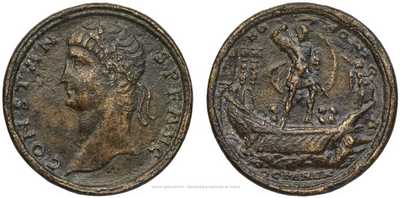| Back to Constantine the Great | This page is part of the article Roman Coins About Britain | Forward to Further Reading and Thoughts on Collecting |
The final emperor to mint a coin relating to Britain was Constans, Constantine’s youngest son. It appears that he paid a surprise visit to Britain during the winter of 342-343 AD. We know about this visit through the writings of Julius Firmicus Maternus (writing in 346 AD):
“You [Constans] conquered your enemies; you have extended your authority, and so that greater glory might be added to your virtues, you have changed and scorned the order of the seasons, trampling underfoot the swelling, raging waves of Ocean in winter time, a deed unprecedented in the past, and not to be matched in the future. Beneath your oars trembled the waves of a sea still scarcely known to us, and the Briton trembled before the face of an emperor he did not expect”. De Errore Profanarum Religionum (Chapter 28)
and Libanius (writing in 344-348 AD):
“… he [Constans] did not sit and wait upon the beach until when the fair weather came the ocean would calm the storm, but immediately just as things were, with the winter at its height and everything roused by the season to a peak of fury – clouds, icy chills and surf – without giving prior word to the cities there and without announcing the launch in advance, not wishing to be admired for his purpose before achieving his objective, he embarked a hundred men, so it is reported. He loosed the mooring cables and began cutting through the ocean, and all immediately changed to calm. The ocean flattened its wave and made itself smooth for the emperor’s passage, and that usual ebbing of the sea then confuted its law and held on to the land.
…
If therefore after the island had rebelled, its inhabitants were holding an uprising, and the empire was being plundered, the news had arrived, and he had been seized with rage on hearing it and had thrown the die for the voyage, to report his act of daring would not have been to the credit of his resolve, but the crisis deriving from the rebels would have taken away the greater part of the glory. But in fact affairs in Britain were settled. He was completely free to enjoy the wonders of the ocean from the land. There was no cause of anxiety compelling him to make the voyage greater than the harm he would have to suffer if he refused the trip. This was the situation and there was no necessity present, or rather there was only one necessity present, in his desire to set his hand to everything. He willingly gave himself over to the greatest dangers, as though going to suffer the greatest losses if he did not take the greatest risks”. Oration LIX: Panegyric of Constantius and Constans
and Ammianus Marcellinus (writing around 390 AD):
“But in Britain in the tenth consulship of Constantius and the third of Julian raids of the savage tribes of the Scots and the Picts, who had broken the peace that had been agreed upon, were laying waste the regions near the frontiers, so that fear seized the provincials, wearied as they were by a mass of past calamities. And Julian, who was passing the winter in Paris was distracted amid many cares, was afraid to go to the aid of those across the sea, as Constans once did (as I have told)”. Ammianus Marcellinus, Res Gestae Libri XXXI, Book XX
This visit to Britain is sometimes said to have been in response to an incursion by the Picts and the Scots, but Libanius is quite clear that the situation in Britain was calm and settled. The only reference to a campaign against the Picts and Scots comes from Ammianus Marcellinus, writing 47 years after the event. Julius Firmicus Maternus and Libanius wrote their passages at the time and would have surely mentioned a military campaign in Britain, but they don’t. If there was a campaign, it wasn’t worthy of even writing about. Instead, they both focus on the fact that he sailed to Britain in the middle of winter.
And that’s what the coin we’re interested in celebrates. RIC 8 Rome 338 is a medallion showing Constans in military attire standing on a galley, with Victory, two standards, and three oarsmen. Behind the ship is a tower and Oceanus is below. The legend is BONONIA OCEANEN. Bononia is now known as Boulogne in France, and is where Constans would have set sail from.
Photo Source gallica.bnf.fr / BnF. Number FRBNF44974338
The military overtones on this medallion suggests that it celebrates a victory, and while the first thought might be a victory over some tribes in Britain, the fact that Constans is levelling his spear at Oceanus, coupled with the two passages above, suggests that this commemorates his victory over the ocean which would have been quite a feat considering most sailors at the time wouldn’t even sail in the Mediterranean during the winter.
The medallion is unique and can be found in the Bibliothèque nationale de France.
Article Navigation
| Back to Constantine the Great | Up to Roman Coins About Britain | Forward to Further Reading and Thoughts on Collecting |

